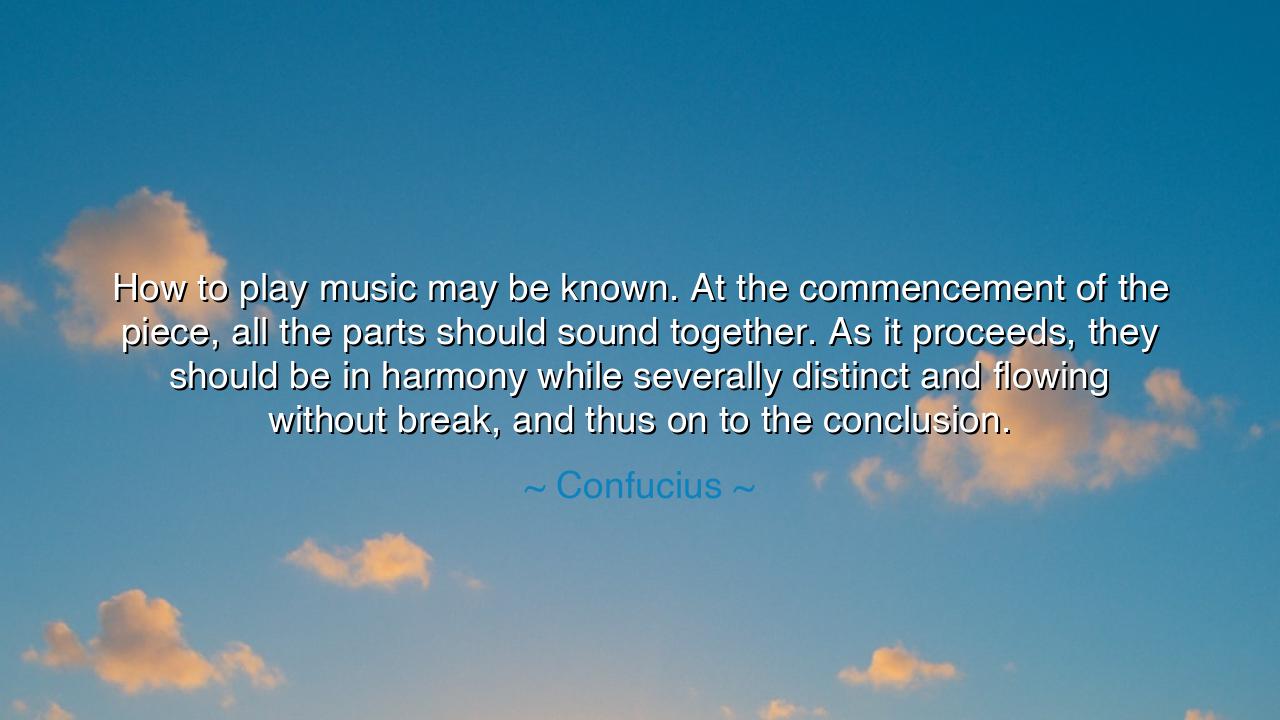
How to play music may be known. At the commencement of the
How to play music may be known. At the commencement of the piece, all the parts should sound together. As it proceeds, they should be in harmony while severally distinct and flowing without break, and thus on to the conclusion.






Hear the words of the sage Confucius, master of harmony and order, who declared: “How to play music may be known. At the commencement of the piece, all the parts should sound together. As it proceeds, they should be in harmony while severally distinct and flowing without break, and thus on to the conclusion.” Though he speaks of music, he is not teaching only of instruments and tones. He is teaching of life, of society, of the way that human beings may live together in balance and in peace.
When he says that all the parts should sound together at the commencement, he speaks of unity at the beginning of every endeavor. Just as a song must begin with one shared rhythm, so too must communities, families, and nations begin with agreement and purpose. Without a common starting point, there is only noise and confusion. The first step of harmony is alignment, when all voices agree to begin the song together.
As the piece proceeds, Confucius reminds us that harmony does not mean sameness. Each voice, each instrument, must remain severally distinct, bringing its own tone, its own beauty, its own color. Yet these differences must not clash; they must flow together without break. Here is the wisdom: unity is not the crushing of individuality, but the weaving of difference into a greater whole. A song with only one note is dull, but a song with many voices in harmony is glorious.
History bears witness to this truth. Consider the founding of the United States, where men of different colonies, beliefs, and tempers came together to compose a new nation. At the commencement, they joined as one to declare independence. As they proceeded, each state, each leader, remained distinct in voice, yet bound to harmony by a shared constitution. When this harmony held, the song of liberty flourished; when it faltered, the music broke into discord. This is precisely the lesson of Confucius, spoken across the ages.
The teaching also applies to the life of the individual. Within each of us are many parts—desires, duties, passions, fears. To live well is to make them harmonize without breaking. At the start of a task, we must unite all our energies toward one goal. As we proceed, we must let each strength and talent play its part, distinct yet balanced. And at last, we must bring the work to conclusion with grace, as music ends with resolution. Thus, the art of playing music becomes the art of living well.
Confucius also teaches us about continuity. A song that stumbles, that breaks suddenly, loses its power. So too must we seek to live lives of steady flow—consistent in virtue, unbroken in integrity, unwavering in commitment. Life’s greatness is not measured in bursts of noise, but in the steady harmony carried to the end. This is why he likens music to the Way itself: both demand constancy, patience, and devotion to balance.
O children of tomorrow, take this lesson to heart: whether in your families, your communities, or your own soul, begin in unity, proceed in harmony, remain distinct yet balanced, and flow without break to the conclusion. Let your life be as a symphony—each day a note, each year a movement, each deed a chord in the great composition of your existence.
So remember the words of Confucius: music teaches us how to live together, how to live within ourselves, how to begin, to endure, and to end with grace. Live as music lives—united in beginning, diverse in harmony, flowing without interruption, and resolved in the end. Then your life shall be not noise, but a song that echoes beyond the years.






AAdministratorAdministrator
Welcome, honored guests. Please leave a comment, we will respond soon